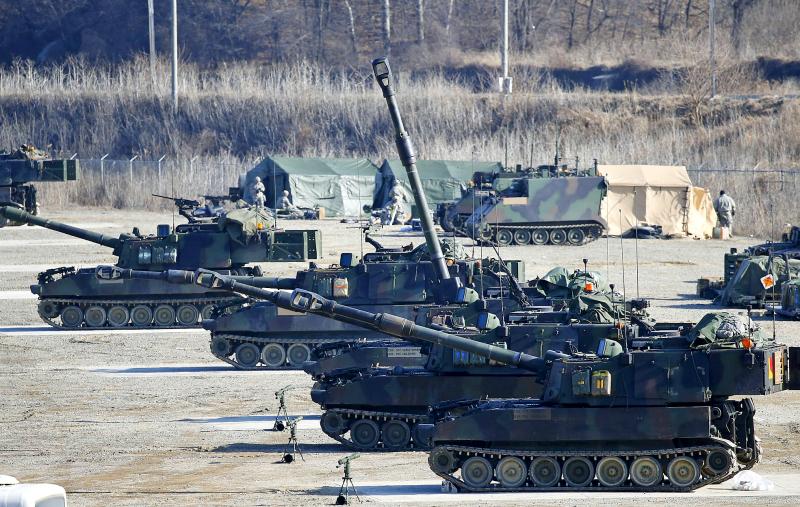The Ministry of National Defense yesterday said it was considering alternative weapons options after the US informed it that the delivery of an artillery system would be delayed due to a “crowded” production line.
Washington last year approved the potential sale of 40 155mm M109A6 Paladin self-propelled howitzers to Taiwan in a deal valued at up to US$750 million.
Eight of the artillery systems were originally set for delivery next year, with 16 more expected in 2024 and 16 in 2025.

Photo: Reuters
However, the ministry said that because of a “crowded” production line for the M109A6, the US said it would not happen until 2026 at the earliest.
It is considering other precision and long-range alternative weapons systems, including truck-based rocket launchers made by Lockheed Martin Corp called the High Mobility Artillery Rocket System, or HIMARS, the ministry added.
It did not say why the production line was snarled, but the US has been ramping up its military support and supply of equipment for Ukraine following Russia’s invasion.
Taiwan is undertaking a military modernization program to improve its capabilities to fend off a Chinese attack, including with precision weapons such as missiles.
Asked about the delay, National Policy Foundation associate research fellow Chieh Chung (揭仲) yesterday said that it would severely affect national defense capabilities by delaying automation of the artillery command.
While Washington has been suggesting that Taiwan improve its defenses by lengthening compulsory military service and establishing a territorial defense force, it virtually canceled the M109A6 deal, he said.
“It seems like a logical contradiction,” he said, adding that it might indicate a serious communication problem between the two sides.
The M109A6 would be invaluable to Taiwan’s forces, as it is not only highly mobile, but also able to obtain the enemy’s targeting information, calculate and order a strike automatically, all in less than a minute, Chieh said.
It would therefore go a long way toward automating the artillery command, shortening engagement time and improving accuracy, all of which are critical to national defense operations, he said.
Most artillery systems must wait for precise targeting information from a central command, which could take about five minutes from enemy launch, he said.
The delay would make it difficult to deal with the fast-paced and highly mobile forces China would send in a first strike, Chieh added.
This first wave of elite Chinese forces would likely maintain air superiority, using various types of reconnaissance equipment, including tactical drones, he said.
While the military might have many traditional towed artillery units, they would not last long on the battlefield due to their lack of mobility and long engagement time, Chieh added.

CHAOS: Iranians took to the streets playing celebratory music after reports of Khamenei’s death on Saturday, while mourners also gathered in Tehran yesterday Iranian Supreme Leader Ayatollah Ali Khamenei was killed in a major attack on Iran launched by Israel and the US, throwing the future of the Islamic republic into doubt and raising the risk of regional instability. Iranian state television and the state-run IRNA news agency announced the 86-year-old’s death early yesterday. US President Donald Trump said it gave Iranians their “greatest chance” to “take back” their country. The announcements came after a joint US and Israeli aerial bombardment that targeted Iranian military and governmental sites. Trump said the “heavy and pinpoint bombing” would continue through the week or as long

TRUST: The KMT said it respected the US’ timing and considerations, and hoped it would continue to honor its commitments to helping Taiwan bolster its defenses and deterrence US President Donald Trump is delaying a multibillion-dollar arms sale to Taiwan to ensure his visit to Beijing is successful, a New York Times report said. The weapons sales package has stalled in the US Department of State, the report said, citing US officials it did not identify. The White House has told agencies not to push forward ahead of Trump’s meeting with Chinese President Xi Jinping (習近平), it said. The two last month held a phone call to discuss trade and geopolitical flashpoints ahead of the summit. Xi raised the Taiwan issue and urged the US to handle arms sales to

BIG SPENDERS: Foreign investors bought the most Taiwan equities since 2005, signaling confidence that an AI boom would continue to benefit chipmakers Taiwan Semiconductor Manufacturing Co’s (TSMC, 台積電) market capitalization swelled to US$2 trillion for the first time following a 4.25 percent rally in its American depositary receipts (ADR) overnight, putting the world’s biggest contract chipmaker sixth on the list of the world’s biggest companies by market capitalization, just behind Amazon.com Inc. The site CompaniesMarketcap.com ranked TSMC ahead of Saudi Aramco and Meta Platforms Inc. The Taiwanese company’s ADRs on Tuesday surged to US$385.75 on the New York Stock Exchange, as strong demand for artificial intelligence (AI) applications led to chip supply constraints and boost revenue growth to record-breaking levels. Each TSMC ADR represents

State-run CPC Corp, Taiwan (CPC, 台灣中油) yesterday said that it had confirmed on Saturday night with its liquefied natural gas (LNG) and crude oil suppliers that shipments are proceeding as scheduled and that domestic supplies remain unaffected. The CPC yesterday announced the gasoline and diesel prices will rise by NT$0.2 and NT$0.4 per liter, respectively, starting Monday, citing Middle East tensions and blizzards in the eastern United States. CPC also iterated it has been reducing the proportion of crude oil imports from the Middle East and diversifying its supply sources in the past few years in response to geopolitical risks, expanding